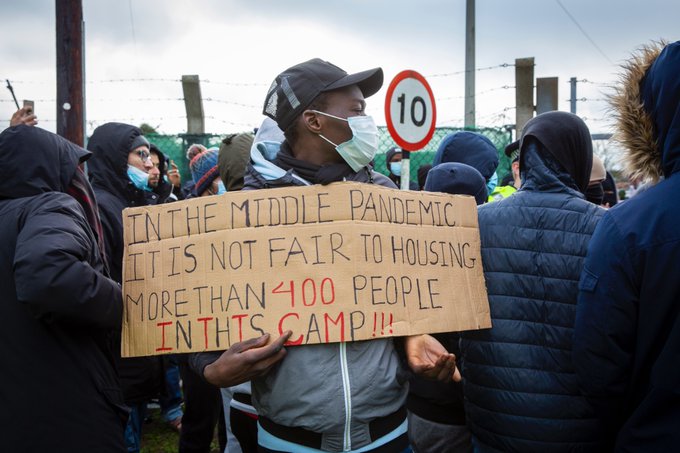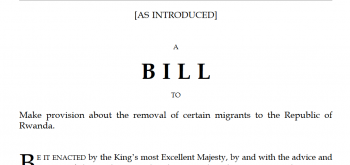Asylum seekers were ‘falsely imprisoned’ in ‘detention-like’ Napier barracks, High Court rules
The Home Secretary’s decision to use Napier barracks to accommodate vulnerable asylum seekers was unlawful and irrational, the High Court has ruled. The Napier barracks in Folkestone, a former military site, was an unsuitable place to accommodate asylum seekers, the Court said, and contributed to a ‘significant deterioration’ in the wellbeing of the residents.
The case, brought by six former residents of the barracks, challenged the decision to deprive cross-channel migrants of their liberty in the ‘detention-like’ site, which had overcrowded dormitories and lack of privacy. It was found that the Home Secretary had ignored advice from Public Health England and failed to implement measures to protect residents from the risk of COVID-19, leading to it becoming ‘virtually inevitable’ that they would contact a disease ‘capable of causing hospitalisation, long-term harm and death’.
The Home Secretary, Priti Patel, also ignored a report from the Fire Safety Inspectorate which warned that the resident asylum seekers were not adequately protected from fire.
The Judge, Mr Justice Linden, said: ‘Whether on the basis of the issues of COVID or fire safety taken in isolation, or looking at the cumulative effect of the decision making about, and the conditions in, the barracks, I do not accept that the accommodation there ensured a standard of living which was adequate for the health of the claimants. Insofar as the defendant considered that the accommodation was adequate for their needs, that view was irrational.’
The judge said noted that the Claimants were not supposed to be detained. ‘What is at issue here is accommodation in which they were supposed to live voluntarily pending a determination of their applications for asylum.When this isconsidered, a decision that accommodation in a detention-like setting – a site enclosed by a perimeter fence topped with barbed wire, access to which is through padlocked gates guarded by uniformed security personnel – will be adequate for their needs, begins to look questionable.’
In January, 178 people tested positive for COVID-19 at the barracks. The Home Secretary insisted that while ‘people do mingle’, the barracks was still suitable accommodation. In addition to the increased risk of catching COVID-19, campaigners had complained about the lack of access to legal advice, healthcare, and necessary provisions for potential victims of trafficking.
Two months later, a cross-party group of peers and MPs called on the Home Secretary to close down Napier barracks with ‘immediate effect’, citing concerns of ineffective safeguarding of residents including children, high levels of depression and serious incidents of self-harm, and inadequate COVID-19 safety measures and cramped conditions. Despite prison inspectors describing the site as ‘unsuitable for long-term accommodation’, the Home Office insisted it would continue to run the barracks. In the same month, the High Court case began, with Mr Justice Linden hearing arguments that the accommodation contravened the Home Secretary’s own policies and breached the claimants’ rights under the ECHR.
Clare Jennings, a lawyer who acted for two of the claimants, said that their clients and the the other Napier residents ‘endured months of living cheek-to-jowl with hundreds of other men in overcrowded dormitories, without any privacy, at risk of injury from fire and covid-19, which has seriously affected their mental and physical health’. ‘For months the Home Secretary ignored the complaints and concerns of residents, charities and legal representatives that Napier barracks was unsuitable to house destitute asylum seekers, that vulnerable men were wrongly being sent to the barracks, and that the continued use of Napier was endangering the physical mental health of residents. The evidence which emerged during the course of this case shows that the Home Secretary similarly ignored advice from Public Health England and local health protection teams that a Covid-19 outbreak was inevitable, and failed to take action to address serious fire safety concerns, further risking the well-being and health of residents. Today, these residents of Napier barracks were finally heard. This judgment confirms that Napier barracks did not provide adequate accommodation for the asylum seekers housed there and should never have been used. Urgent action is now required from the Home Secretary, in light of this damning judgment, to move those men still at Napier to suitable accommodation and to immediately stop the use of the barracks for housing asylum seeking men.’
Extracts from the judgment: ‘It was inevitable that there would be a major outbreak of Covid-19..’
The Barracks were known to be ‘basic and slightly run down’ and they are surrounded by an 8-foot fence which is topped by barbedwire. Residents would be required to sleep in dormitories with shared bathroom and toilet facilities. The advice of Public Health England was therefore that the Barracks were not suitable to be used to accommodate asylum seekers given the coronavirus pandemic but that, if they were, steps should be taken to reduce the risk of Covid-19 infection.
… The Defendant recognised, however, that conditions at the Barracks were such that they would only be suitable for healthy adult males, and she introduced suitability assessment criteria which were intended to be used to identify asylum seekers who should not be accommodated there because of their particular circumstances, including their mental or physical health and other vulnerabilities arising from experiences before coming to the United Kingdom.
From 22 September 2020, the number of asylum seekers living in the Barracks grew rapidly. By 1 October 2020 there were 155 residents, and the numbers rose to a peak of 414 in mid-November 2020. The residents were generally sleeping 12-14 to a dormitory. Plywood partitioning divided the sleeping spaces, albeit this did not reach from floor to ceiling, and sheets and/or curtains were used to cover the entrance to each space so as to achieve a degree of privacy. For this and other reasons, according to a report of the Crown Premises Fire Safety Inspectorate, dated 30 November 2020, the arrangements at the Barracks failed to protect the occupants from serious or significant risk of harm and action was required to ensure their safety.
On the evidence, it was inevitable that there would be a major outbreak of Covid-19 infections at the Barracks. This happened in mid-January 2021. At this stage there were around 380 residents on site. In response to the outbreak, approximately 100 residents were moved out of the Barracks during the fourth week of January 2021 and the population continued to reduce thereafter.
On 15 January 2021, the residents were told that they were not to leave the site “under any circumstance”. That instruction was reiterated on 28 January 2021 and it remained in place for more than a month. Tensions rose within the Barracks and, on 29 January 2021, there was a major disturbance and a fire was started in one of the accommodation blocks.
…The six Claimants are all asylum seekers who were transferred to the Barracks from accommodation in hotels. The evidence… is that they experienced people trafficking and/or torture prior to their arrival in the United Kingdom and there is evidence in a number of their cases that they had pre-existing mental health issues as a result of their experiences. Under the Defendant’s suitability assessment criteria, these factors ought to have disqualified them from transfer to the Barracks. All of them say that they experienced a deterioration in their mental health as a result of their stays at the Barracks and all of them have been formally diagnosed as suffering from recognised mental health conditions including Post Traumatic Stress Disorder and depression. All were transferred out of the Barracks, but only after legal proceedings were threatened or initiated, based on the contention that the Barracks were unsuitable accommodation for them.







